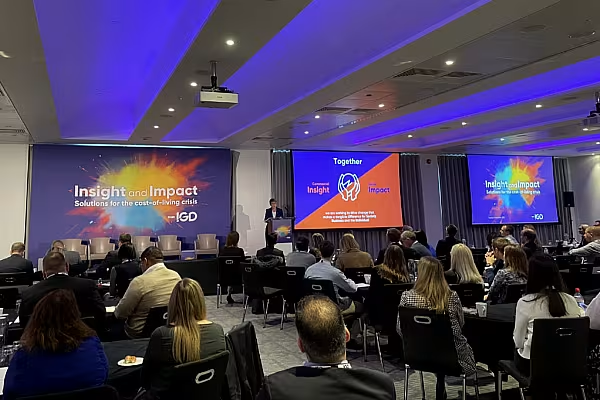IGD’s Insight and Impact event in London addressed the challenges facing retailers, both in the immediate term and beyond. ESM editor Stephen Wynne-Jones reports.
If there was a takeaway phrase from the recent IGD Insight and Impact event in London, it was probably ‘permacrisis’ – such are the multitude of challenges facing retailers and consumer goods brands at present, that the recently nominated Collins Dictionary word of the year was repeated on a myriad of occasions by various speakers, albeit in different contexts.
This event was not about wallowing in self-pity at the current situation, however. Rather, it was about developing solutions to tackle head-on both the immediate concerns and those coming further down the track.
Inflation Nearing Its Peak?
IGD raised headlines earlier this year when it suggested that food price inflation in the UK might hit as high as 14% to 16% by the third quarter – and so it has come to be. With the recent September data indicating an actual inflation rate of 14.5%, attention has now turned to just how high inflation could reach in the coming months.
According to IGD chief economist James Walton, food price inflation is likely to hit between 17% and 19% in the early part of 2023, with bread, dairy, protein, and fresh produce the core drivers.
As Walton noted, this figure, too, is subject to change. Uncontrolled energy prices and a poor harvest may drive inflation yet higher in 2023, while it is “equally possible that we might get a slightly better outcome” – in the case of an alleviation of energy concerns, peace in Ukraine, and other more optimistic projections.
As he noted, “strong inflation is already baked into the system”, meaning that, when the post-inflation period finally arrives, it will be interesting to track the mechanisms though which prices fall again.
Walton was followed by presentations from IGD’s Matthew Stoughton-Harris and Nick Miles, who explored both the current consumer confidence levels – “Shopper sentiment remains bleak,” as Stoughton-Harris put it – and how international retailers are responding to the current economic situation.
As an interesting slide during Miles’s presentation pointed out, global grocery sales are set to grow by 4.5%, year on year, between now and 2027, but in most regions, this will almost entirely be driven by inflation – Asia being the outlier.
Continuous Volatility
Ashwin Prasad, group chief product officer, Tesco, took to the stage next, for a keynote presentation, spelling out in no uncertain terms the current situation for retailers at present. “We’ve been saying ‘extraordinary’ and ‘unprecedented’ quite a lot in the past few months,” as he put it.
Since 2016’s Brexit referendum, through to the current situation, a series of crises has led to “volatility becoming a feature of our retail industry”, Prasad explained, but what if this were to continue indefinitely – or, to put it another way, if volatility became the new normal, what would it mean for retailer supply chains?
“You can’t mitigate for it. There’s nothing that will shield you from the impact,” he said. “The challenge is what you do to absorb that impact and react to it.”
Flexibility (including reacting to market signals), using technology to plan more effectively, and greater visibility in the supply chain are all focus areas that can provide a softer landing, Prasad suggested, adding that the ability of the industry to work together during COVID should inspire similar discussions in dealing with the current malaise.
“We know there is volatility to come,” he explained. “This industry can be extraordinary when we come together.”
Supply Chain Challenges
After the morning coffee break, attention turned to the end-to-end supply chain, and how a different approach to supply chain thinking will be required to tackle the challenges of tomorrow. As IGD’s Aneta Zlotkowska pointed out, some 86% of businesses focus the majority of their attention on the operational, day-to-day aspects of the supply chain, leaving little space for strategic thinking, including “creating new revenue and identifying commercial opportunities”.
Other speakers in this segment included Unilever’s global omnichannel manager, Bindu Sudra, LPR UK & Ireland’s Diane Carroll, former Pladis vice-president of sales Scott Snell, and IGD commercial solutions manager Adam Jones, who were united in their call for greater collaboration as a tool in tackling supply chain challenges.
“Collaboration is critical for us,” Sudra explained. “This is something we need to face together – how can we create a bigger impact by working together?” – or, as Carroll put it, “The solutions that are more effective are where everyone is involved, where everyone is around the table.”
At Home Vs Out Of Home
After lunch, IGD’s UK head of insight, Rhian Thomas, explored the opportunities for growth in out-of-home consumption, which have seen a faster-than-expected recovery than forecasted, although cost-of-living concerns are such that many consumers are being more selective about where they eat out.
“Consumers want to protect the occasion [of going out], rather than what they are buying,” Thomas explained, adding that the “experience of going out to eat is as important as the meal itself”.
At-home consumption is also on the increase as a result of the constrained consumer wallet, and a further discussion followed on driving incremental sales in the retail channel. As the Co-op’s Rebecca Oliver Mooney put it, more than half of shoppers go into a store without knowing what they are going to eat that evening, and “stand in front of the shelves, looking for inspiration,” opening up countless possibilities for retailers and brands alike.
As Coca-Cola Europacific Partners’ Sally Orland put it, any approach to driving incremental sales needs to start with the shopper – “What does the shopper want?” She also suggested that while private label has made traction in terms of attracting shoppers, mainstream brands and retailers have a great opportunity to create new consumption occasions by working together. “Replicating the ‘out of home’ in home is where brands can position themselves stronger than private label,” Orland said.
Setting Up For Future Success
The final segment commenced with a presentation from IGD global insight leader Toby Pickard, who told attendees that “transitioning around sustainability, health and omnichannel” will be key to winning both in the short and medium-to-long terms.
On sustainability, in particular, Pickard pointed out that many retailer targets (particularly with regard to plastic reduction) have set 2025 as their benchmark date, meaning that the industry will have to “focus a little bit harder” over the 1,000 days (or 780 working days) remaining in order to achieve said goals.
“These targets are going to become much more challenging,” he observed.
That paved the way for an insightful conversation with Tomasz Blicharski of the Żabka Future division of Żabka Polska, a retailer that has embraced digital transformation as part of its modus operandi.
Blicharski encouraged firms to think about separating the typical operational functions of their business and the innovative side, “so that they can really focus on creating something new.” At Żabka, this approach has led to the development of the Żabka Nano autonomous convenience store format, ‘Robbie’ the hot dog-making robot, and countless other innovations.
The day wrapped up with a panel discussion on the question of resilience and setting up a business for future success, which featured input from Graze, Birds Eye UK & Ireland, Co-op and IGD.
As Joanna Allen, chief executive of healthy-snacking firm Graze, put it, businesses should consider the various shopping missions of consumers and “embrace” them, using said interactions to help “drive the conversation beyond value”.
Birds Eye’s Steve Challouma, meanwhile, encouraged those present to think of strategy as a “two-way process” – given that retailers and manufacturers often have their own strategies around category growth, identifying the areas of overlap should be a key focus. “There’s no point in having collaboration if you don’t know where you’re going,” he explained.
Wise words – after all, if we’re going to conquer a world of ‘permacrisis’, we’re going to have to work together.
© 2022 European Supermarket Magazine – your source for the latest retail news. Article by Stephen Wynne-Jones. Click subscribe to sign up to ESM: European Supermarket Magazine.














